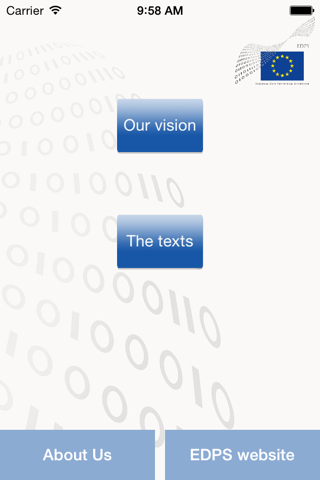
EU Data Protection is a FREE product brought to you by the European Data Protection Supervisor (EDPS). It allows you to consult the official texts of Regulation 2016/679 (the General Data Protection Regulation or GDPR) and the Directive 2016/680 for the police and criminal justice sector as published in the Official Journal of the EU on 4 May 2016. This app also allows you to read the new rules alongside those they replace, the original legislative proposals of the European Commission, and the recommendations from the EDPS.
20 years after the adoption of the Data Protection Directive 95/46/EC, the EU legal framework for personal data protection has been modernised. The reform constitutes a historic moment for data protection as the updated rules will have far-reaching implications for both individuals and businesses for years to come.
The GDPR and the Directive were published in the Official Journal L 119 on 4 May 2016. The GDPR will become directly applicable in all Member States from 25 May 2018. Member States will have to transpose the Directive in their national laws by 6 May 2018 (with exceptions).
This app also includes the history of the reform process and allows you to read the GDPR alongside the original rules contained in the Data Protection Directive 95/46/EC, the initial legislative proposal of the European Commission, and the recommendations issued by the EDPS in 2015. The new Directive can be read alongside the original rules contained in the Council Framework Decision 2008/977/JHA, the original legislative proposal of the European Commission, and the recommendations of the EDPS.
You can load all the texts in any given combination to compare them side-by-side on your screen. You can load one or two texts at a time on smartphones due to the limitation of screen size.
The EDPS is an independent supervisory authority with responsibility for monitoring the processing of personal data by the EU institutions and bodies, advising on policies and legislation that affect privacy and closely cooperating with similar authorities to ensure consistent data protection. Several times during the process of European Commission, Parliament and Council of the European Union negotiations of these final texts, the EDPS provided his expert advice on how best to safeguard the fundamental right to the protection of personal data in Europe.
The European Union is based on a unique economic and political partnership between 28 European countries that together cover much of the continent.
The EU is based on the rule of law: everything that it does is founded on treaties, voluntarily and democratically agreed by all countries. These binding agreements set out the EUs goals in its many areas of activity. There are 3 main institutions involved in EU legislation:
• the European Parliament, which represents the EU’s citizens and is directly elected by them;
• the Council of the European Union, which represents the governments of the individual member countries. The Presidency of the Council is shared by the member states on a rotating basis;
• the European Commission, which represents the interests of the Union as a whole.
Together, these three institutions produce the policies and laws that apply throughout the EU. In principle, the Commission proposes new laws, and the Parliament and Council adopt them. The Commission and the countries then implement them, and the Commission ensures that the laws are properly applied and implemented.


